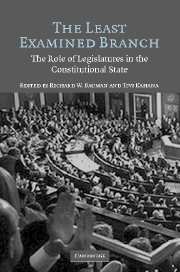Book contents
- Frontmatter
- Contents
- Foreword: Legislatures in the Constitutional State by Amy Gutmann
- Contributors
- New Ways of Looking at Old Institutions
- PART ONE LEGISLATURES AND DEMOCRATIC THEORY
- PART TWO LEGISLATING AND DELIBERATING IN THE DEMOCRATIC LEGISLATURE
- PART THREE CONSTITUTION MAKING BY LEGISLATURES: THE EXPLICIT VERSION
- 9 Legislatures as Constituent Assemblies
- 10 Legislatures and the Phases and Components of Constitutionalism
- 11 Legislatures and Constitutional Agnosticism
- 12 Constitutional Amendments and the Constitutional Common Law
- PART FOUR CONSTITUTION MAKING BY LEGISLATURES: THE IMPLICIT VERSION
- PART FIVE CONSTITUTIONAL INTERPRETATION AND APPLICATION BY THE LEGISLATURE
- PART SIX IS LEGISLATIVE CONSTITUTIONALISM POSSIBLE?
- PART SEVEN THE LEGISLATURE IN DIALOGUE: DOMESTIC AND INTERNATIONAL CONTEXTS
- Index
11 - Legislatures and Constitutional Agnosticism
Published online by Cambridge University Press: 06 August 2009
- Frontmatter
- Contents
- Foreword: Legislatures in the Constitutional State by Amy Gutmann
- Contributors
- New Ways of Looking at Old Institutions
- PART ONE LEGISLATURES AND DEMOCRATIC THEORY
- PART TWO LEGISLATING AND DELIBERATING IN THE DEMOCRATIC LEGISLATURE
- PART THREE CONSTITUTION MAKING BY LEGISLATURES: THE EXPLICIT VERSION
- 9 Legislatures as Constituent Assemblies
- 10 Legislatures and the Phases and Components of Constitutionalism
- 11 Legislatures and Constitutional Agnosticism
- 12 Constitutional Amendments and the Constitutional Common Law
- PART FOUR CONSTITUTION MAKING BY LEGISLATURES: THE IMPLICIT VERSION
- PART FIVE CONSTITUTIONAL INTERPRETATION AND APPLICATION BY THE LEGISLATURE
- PART SIX IS LEGISLATIVE CONSTITUTIONALISM POSSIBLE?
- PART SEVEN THE LEGISLATURE IN DIALOGUE: DOMESTIC AND INTERNATIONAL CONTEXTS
- Index
Summary
As constitutional actors, legislatures are accustomed to asserting their understanding of the constitutionality of the legislation they enact. They are also not uncommonly engaged in constitutional disputes with other constitutional actors. At times, they appear to be avoiding their constitutional role, informally “delegating” it to another actor, and for this they are likely to be subject to criticism. But are there times legislatures – and legislators – stand back, suspend judgment, and engage in what I am calling “constitutional agnosticism”? Are there times when they should be?
Whether constitutions are limited to institutional organization or are aspirational, written or unwritten or a hybrid, easy or difficult to amend, one thing they must do is help maintain stability in the country, at least sufficient to allow for orderly transition of power within a recognized government structure. At a higher level, the constitution may play a much greater role in shaping common values or in allowing a regular “conversation” about identifying and defining the values that “matter.” Without saying that both of these are functions the Constitution must fulfill, they are important functions that constitutions do fulfill and the first, if the country is to function at all, must be filled in some manner or under some authority.
The constitution's capacity to meet these goals of stability, orderly transition, and/or shaping of the nation's value structure depends on the extent to which it is recognized as “legitimate” by the public or by those who have been acknowledged as “speaking for” the public.
- Type
- Chapter
- Information
- The Least Examined BranchThe Role of Legislatures in the Constitutional State, pp. 214 - 228Publisher: Cambridge University PressPrint publication year: 2006



